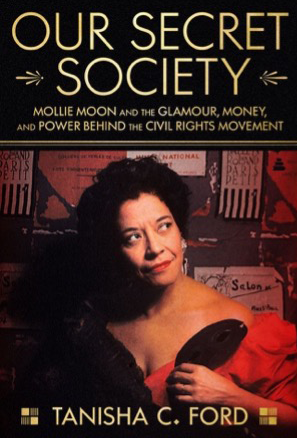mediaroom
‘Our Secret Society’ Wins Hooks National Book Award
History Professor’s Work a Detailed Portrait of Overlooked Civil Rights Figure
Thursday, Dec. 12, 2024 —The Benjamin L. Hooks Institute for Social Change at the University of Memphis has
selected “Our Secret Society: Mollie Moon and the Glamour, Money and Power Behind
the Civil Rights Movement” by historian and professor Tanisha C. Ford as the 2023
Hooks National Book Award winner. The award will be presented to Ford when she visits the UofM next spring.
presented to Ford when she visits the UofM next spring.
Ford’s book traces the life of Mollie Moon, president of the National Urban League
Guild, and her fundraising efforts for activists throughout the Civil Rights Movement.
“While her work began abroad making friendships with Harlem Renaissance authors like
Langston Hughes and Dorothy West in the 1930s, her time in New York found Mollie at
the center of social and political life, one that involved multiple Black political
and civic organizations,” said Terrence Tucker, chair and professor in the University
of Memphis Department of English and chair of the Hooks National Book Award committee.
“Yet it was the interracial Beaux Arts Ball that, perhaps, brought Moon the most attention.”
According to Tucker, while the glamour of the Beaux Arts Ball rivaled today's star-studded
Met Gala, its inclusiveness of working-class African Americans, in addition to rich
whites and middle-class Blacks, attempted to transcend the divisions that would later
threaten to splinter the movement in the late 1960s.
Published by Amistad/Harper Collins, “Our Secret Society” was also named the winner
of the 2024 NAACP Image Award for Outstanding Literary Work Biography/Autobiography.
Finalists for the Hooks National Book Award were chosen from 49 books that were nominated
for the 2023 award. In addition to “Our Secret Society” other finalists included:
- “Food Power Politics: The Food Story of the Mississippi Civil Rights Movement” by Bobby J. Smith II (University of North Carolina Press)
- “King: A Life” by Jonathan Eig (Farrar, Straus and Giroux)
- “Multiracial Promise: Harold Washington's Chicago and the Democratic Struggle in Reagan's America” by Gordon K. Mantler (University of North Carolina Press)
- “You Have to be Prepared to Die Before You Can Begin to Live: Ten Weeks in Birmingham that Changed America” by Paul Kix (Celadon Books)
In addition to Tucker, four others are on the selection committee:
- Beverly Cross - Lillian and Morrie Moss Chair of Excellence in Urban Education, UofM
- Aram Goudsouzian - Bizot Family Professor of History, UofM
- Shatavia Wynn, assistant professor of Religious studies and Africana studies, Rhodes College
- Ladrica Menson-Furr - assistant dean UofM College of Arts & Sciences, associate professor of English, UofM
Historian and cultural critic Ford brings Mollie into focus as never before, charting
her rise from Jim Crow Mississippi to doyenne of Manhattan and Harlem, where she became
one of the most influential philanthropists of her time — a woman feared, resented,
yet widely respected. Ford chronicles Mollie’s larger-than-life antics through exhaustive
research, never-before-revealed letters and dozens of interviews.
An engrossing social history, “Our Secret Society” brilliantly illuminates a little
known yet highly significant aspect of the Civil Rights Movement that has been long
overlooked — the powerhouse fundraising effort that supported the movement — the luncheons,
galas, cabarets and traveling exhibitions attended by middle-class and working-class
Black families, the Negro press and titans of industry, including Winthrop Rockefeller.
“Like many women whose roles in the Civil Rights Movement were ignored or marginalized,
Moon's role has been rarely explored,” Tucker said. “Ford's book recovers Moon as
a central figure throughout the 20th century while expanding notions of what organizing
and supporting the fight for racial justice could be.”
####
MEDIA CONTACTS:
Jennifer Godwin
Media and Public Relations
jennifer.godwin@memphis.edu
(O) 901.678.4822 (M) 501.529.7482
Amy Ruggaber
Assistant Director
The Benjamin L. Hooks Institute for Social Change
University of Memphis
krggaber@memphis.edu
